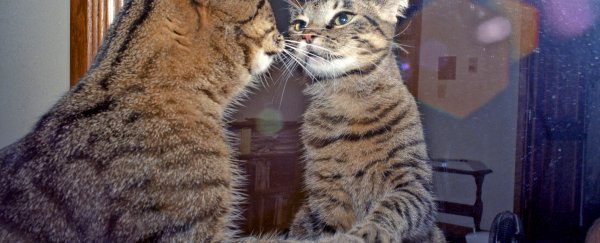Self-awareness is often thought of as a uniquely human trait, but new research suggests that it may be more common than previously thought across the animal kingdom. In fact, the study argues that any animal capable of imagining the future outcomes of their actions must have a primitive sense of self.
The research, conducted by a team of psychologists and philosophers from the University of Warwick in the UK, isn't based on any experimental evidence and is far from conclusive, but it does call into question the way we think about self-awareness and the cognitive capabilities of animals.
"The study answers a very old question: do animals have a sense of self?" one of the lead researchers, Thomas Hills, said in a press release. "The key insight is that those animals capable of simulating their future actions must be able to distinguish between their imagined actions and those that are actually experience."
The work built on a study conducted in the 1950s, in which rats were sent through a maze to find food. At certain points, the rats were forced to make a decision about which way to go next, and the researchers observed that at these 'choice points' the rats often stopped and appeared to deliberate over their actions.
More recently, neuroscientists found that regions of the hippocampus, which are associated with simulating potential choices, were activated at those choice points by rats as well as other vertebrates.
So Hills's team set out to try to understand what that might mean for a rat's self-awareness, by modelling what could be going on inside its brain at each of these choice points.
They worked out that, if the rats were simulating future events but had no sense of self, it would lead to the formation of false memories, as the animals wouldn't be able to discern between the situations they'd just imagined and reality. And if this were the case, the rats wouldn't be able to make proper decisions about where to seek out food next - which didn't happen in the experiments.
So this led to the conclusion that the rats must be able to discern the difference between real experiences and imagined experiences. And to do this, they needed some kind of self-awareness, according to the team's models. They call this the ability to tag the 'primal self'.
"Our first aim was to understand the recent neural evidence that animals can project themselves into the future," said Hills. "What we wound up understanding is that, in order to do so, they must have a primal sense of self."
But before you get too freaked out about what that means for our own sense of self as a species, don't panic. "Readers should not be too worried," the researchers write in Current Zoology, where their results are published. "We promise to arrive far short of the kind of self-awareness commonly attributed to humans."
Of course, there's a lot of research that needs to be done before this hypothesis is confirmed, but it definitely opens up some interesting possibilities.
"As such, humans must not be the only animal capable of self-awareness," added Hills. "Indeed, the answer we are led to is that anything, even robots, that can adaptively imagine themselves doing what they have not yet done, must be able to separate the knower from the known."
